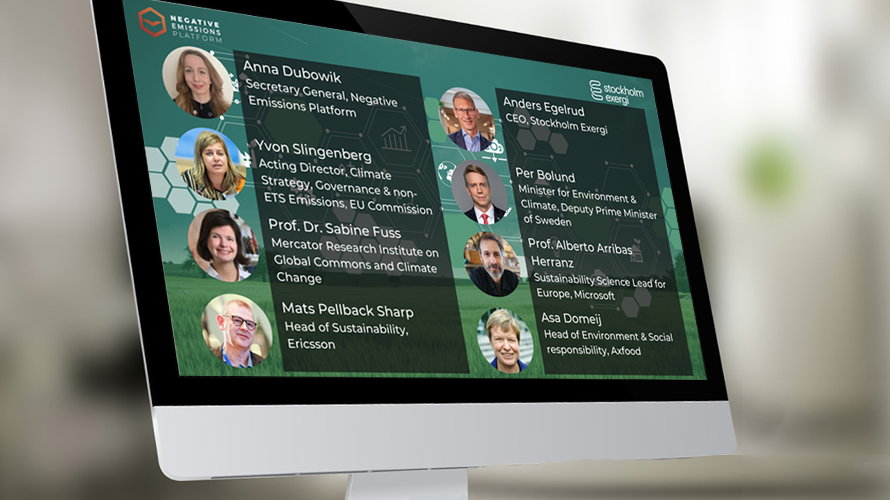At our webinar on Tuesday 25 May regarding an EU market for negative emissions, it was clear that both the political and the business communities are willing to move forward on the issue.
Negative emissions are urgently needed. So can we summarize climate researcher Sabine Fuss’ introduction to our webinar on a future EU market for negative emissions organized by Negative Emissions Platform and Stockholm Exergi. With the other participants agreeing with Sabine Fuss’s assessment, the question now is: what is the concrete way forward for establishing negative emissions as a real element in climate politics and policy?
Researchers, representatives from the business community and politicians took part to provide their views on this issue. Yvon Slingenberg, director of the EU Commission’s division for climate measures, was clear about how the EU views the potential for negative emissions.
“Even with our best efforts to limit fossil fuels in the economy, a number of emissions will remain, so we need carbon capture to compensate for these emissions,” she stated.
She said that there is a demand for negative emissions and there needs to be political initiatives to further boost its development.
“In order to develop solutions for carbon capture there need to be new rules and regulations that are in line with our goals of being climate neutral. We are working hard with new certification frameworks for carbon capture, which is why robust reporting and monitoring are necessary for us to integrate carbon capture into climate politics. This is our highest priority,” she said.
Slingenberg also talked about how the EU is working to establish a mechanism to guarantee the same level of quality in all member states.
”Such a mechanism would have potential to mobilize the financial resources needed,” she said.
Jakob Lundgren, political expert at the Swedish Ministry for Environmental Affairs, confirmed that fossil emissions exist that cannot be avoided.
”Certain emissions will be difficult to phase out. To reach Sweden’s goal of net zero emissions and negative emissions after that, we need negative emissions technology to compensate for the sectors and industries that cannot eliminate their fossil emissions,” he said.
Lundgren highlighted the results of a recent Swedish government inquiry (Klimatpolitiska vägvalsutredningen), which Sweden is working towards, as well as the Department of Energy’s assignment to craft suggestions about how to formulate a reverse auction for negative emissions.
”When it comes to creating negative emissions, Sweden has a chance to be at the forefront. It is an opportunity that we should take advantage of. The earlier we succeed, the more carbon dioxide we can capture.
Stockholm Exergi is ahead of the curve in developing bio-CCS technology and creating negative emissions. Our CEO Anders Egelrud highlighted that Sweden has the potential to capture more carbon dioxide than is needed within Swedish borders. And so we have a market for negative emissions. Microsoft, Ericsson and Axfood also participated in the seminar where they laid out their needs connected to negative emissions and explained what their demand for it looks like.

